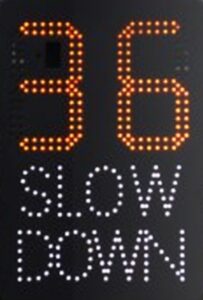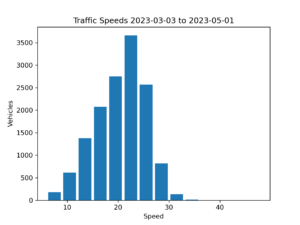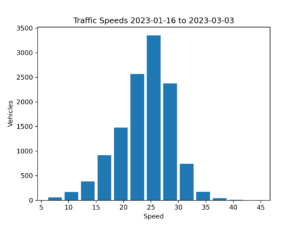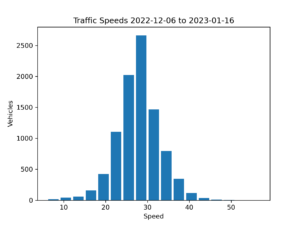-
Speed Sign – Annual Summary – May 2023
-
Speed Sign Update – April 2023

SAM 2 Report for Week All: 2023-03-03 to 2023-05-01
SAM 2 Located at Chapel Road – East Facing – Into Village
Number of vehicles: 14016 over 54 days
Average speed of all vehicles: 20.5mph
Maximum speed recorded: 48mph
Maximum speed of 48mph seen at:
Sun 05/03/2023, 20:40:00
Fri 10/03/2023, 17:45:00
Percentage of vehicles over the limit on all days: 1% (148 of 14016) over 54 days
Percentage of vehicles over the limit on weekdays: 1% (109 of 11263) over 38 days
Percentage of vehicles over the limit on weekends: 1% (39 of 2753) over 16 days
Peak Hour: 15:00-16:00, with 1409 vehicles across 54 daysAverage speed of “speeder” vehicles: 32mph
Average speed of “speeder” vehicles in the Peak Hour: 33mph
Average vehicles per day: 260 (296 on weekdays, 172 at weekends)
-
Algal Bloom on Boughton Pond – Beware
ALGAL BLOOM
DO NOT ENTER POND
AVOID CONTACT WITH WATER
DO NOT FEED DUCKS
Keep pets and children away from the water and avoid skin contact with the water or algae. Do not feed the ducks or throw any food into the pond
Boughton Pond is currently experiencing a suspected algal bloom. These form regularly in the spring and summer and can cause the water to become toxic.
Algae occur naturally in inland waters such as rivers, streams and lakes. When conditions are ideal for growth, an algal bloom can occur. During a bloom, the water becomes less clear and may look green, blue-green or greenish-brown. Scums can form during calm weather when several bloom forming species rise to the surface. This can look like paint, mousse or small clumps.
Cyanobacteria or ‘blue-green algae’, a type of blooming algae, can produce toxins. These toxins can kill wild animals, livestock and pets. They can also harm people, producing rashes after skin contact and illnesses if swallowed.
Algal blooms block sunlight from reaching other plants in the water. They also use up oxygen in the water at night which can suffocate fish and other creatures. Oxygen is also used up when the bloom decays.
-
Vacancy for Clerk position
Calling Boughton; the clerk has unfortunately taken the decision to resign on 31 March 2023 and the position is being advertised:
BPC – Clerk advert – Feb 2023
To dispel any rumours this resignation is due to the clerk being offered a position in a complex and challenging role in his own village, that their council was unable to recruit to fill, and he felt compelled to answer the call.
I have enjoyed working for Boughton for 4 years and wish the best for the future to all.
-
Speed Sign Update – March 2023

SAM 2 Report for Week All: 2023-01-16 to 2023-03-03
SAM 2 Located at Mill Hill Road – West Facing – Mind the Ducks
Number of vehicles: 12172 over 47 days
Average speed of all vehicles: 23.9mph
Maximum speed recorded: 42mph
Maximum speed of 42mph seen at:
Mon 30/01/2023, 05:00:00
Wed 08/02/2023, 05:10:00
Sat 18/02/2023, 19:25:00
Sun 19/02/2023, 08:25:00
Percentage of vehicles over the limit on all days: 8% (926 of 12172) over 47 days
Percentage of vehicles over the limit on weekdays: 8% (804 of 10162) over 35 days
Percentage of vehicles over the limit on weekends: 6% (122 of 2010) over 12 days
Peak Hour: 15:00-16:00, with 1250 vehicles across 47 days
Average speed of “speeder” vehicles: 32mph
Average speed of “speeder” vehicles in the Peak Hour: 33mph
Average vehicles per day: 259 (290 on weekdays, 168 at weekends)
-
Speed Sign Update – December 2022

SAM 2 Report for Week All: 2022-12-06 to 2023-01-16
SAM 2 Located at Mill Hill Road – North Facing – Into Village
Number of vehicles: 9085 over 42 days
Average speed of all vehicles: 27.9mph
Maximum speed recorded: 57mph
Maximum speed of 57mph seen at:
Fri 16/12/2022, 15:45:00
Percentage of vehicles over the limit on all days: 30% (2714 of 9085) over 42 days
Percentage of vehicles over the limit on weekdays: 30% (2172 of 7232) over 30 days
Percentage of vehicles over the limit on weekends: 29% (542 of 1853) over 12 days
Peak Hour: 15:00-16:00, with 952 vehicles across 42 days
Average speed of “speeder” vehicles: 34mph
Average speed of “speeder” vehicles in the Peak Hour: 34mph
Average vehicles per day: 216 (241 on weekdays, 154 at weekends)
-
Please Keep off the Frozen Pond
There have been several reports of children and teens playing on the frozen pond, trying to break the ice!
This is an extremely dangerous activity as the ice is not thick and stable.
The pond has filled up from the drought and whilst it might still only be 1m deep the thick sludge at the bottom and freezing cold temperature would induce shock and panic if the ice were to break and a child fall in.
If there is anyone who hasn’t seen the news in the last 24 hours to see that the consequences can be tragic, then please make sure your children are safe and aware of the dangers!
-
Wellbeing newsletter
Wellbeing Newsletter Winter is Coming
With the Met office issuing weather warnings for cold weather and even possibly snow for Norfolk, we can be sure that winter is well and truly with us.
We know that many amongst us will struggle to stay warm and fed this winter. Below we offer some general advice on how to stay warm without spending too much money. For people needing immediate assistance help is at hand:Community Hot Spots and Libraries
Norfolk County Council working with Norfolk Community Foundation have funded a number of locations where you can go to access services and other help; receive a hot drink and refreshments and a place to socialise and stay warm. Follow the links:
Community Hot Spots
Libraries
Cuppa Care BusFood banks and larders
There are a range of places around the county where food parcels or cheap and wholesome food can be obtained. More information about locations and opening times can be found via the Nourishing Norfolk network, or via the list held on Norfolk ALC’s website:
Nourishing Norfolk
Norfolk ALCGeneral Advice
Wrap up well
- Wear plenty of thin layers rather than one thick one is the best way to keep warm in winter.
- Wear clothes made of wool or fleecy synthetic fibres (cotton is only effective if the garment stays dry)
- Keep your feet warm with rugs and slippers.
- Wear bed socks and thermal underwear at night
- Putting on a coat, hat, scarf, gloves and warm shoes or boots when you go outside. If you’re heading out, make sure you take some extra layers – even if you don’t need them immediately, it’s a good idea to be prepared because the temperature can drop significantly when the sun goes in.
Heat where you need it
- Only heat the rooms you use – heat the living room during the day and the bedroom just before going to sleep. Turn the heating in other rooms down or completely off.
- Keep doors and windows closed.
- The ideal temperature is 64°F (18°C) for your bedroom and 70°F (21°C) for your living room. Check your thermostat or use a room thermometer to monitor temperature, and keep your bedroom window shut on a winter’s night.
- Draw your curtains and tuck them behind the radiator to avoid cold spots.
- Use a hot-water bottle, wheat bag or electric blanket to warm the bed, but never use a hot-water bottle and electric blanket together as this can be dangerous.
- More tips at MoneySavingExpert.
Eat well
- A healthy balanced diet will help keep you warm and healthy in the winter. Make sure you and your family eat at least one hot meal a day like soup which is nutritious, keeps you warm and is inexpensive to make or buy.
- If you have them, microwaves, slow-cookers and airfryers are often the most cost (and energy) efficient ways of creating hot meals.
- Batch cook and reheat in a microwave.
- Get your 5 a day.
- Avoid comfort eating.
Stay active and stay in touch
- Staying active is good for your health. Walking, for example, can be good for you. If the weather prevents you getting outside, stay active indoors by catching up on all the household tasks you’ve been putting off.
- Stay in contact with friends and family, especially if you’ve been stuck in the house for a few days. If you have elderly relatives or neighbours who might need help, check up on them.
The cold weather could be just one of many reasons why someone has tumbled into crisis and needs help and support. Places where that help can be found are contained in our “Help in a Crisis” document available from our website. Good places to try first are as follows:
Norfolk Assistance Scheme can help you get support and financial assistance for food, energy, water, and other household essentials including white goods. You can apply yourself or a support organisation, such as Age UK Norfolk or Citizens Advice can apply on your behalf. 0344 800 8020.
Citizens’ Advice – CABx can offer help with energy bills and with advice on how to reduce your ongoing energy requirements. 0800 144 8848
Norfolk Community Foundation’s Nourishing Norfolk food hubs provide a range of food support. This includes community fridges and larders, food pantries and community supermarkets
Cost of living vouchers – if you are eligible for free school meals you will now receive a monthly ‘cost of living’ voucher. The vouchers will be £15 per month per child with an additional payment of £30 per child in December.
Anglian Water provides an Extra Care Support Service for people who need help paying their water bills including advice, payment breaks, flexible payment plans and discounts. 0800 169 3630
